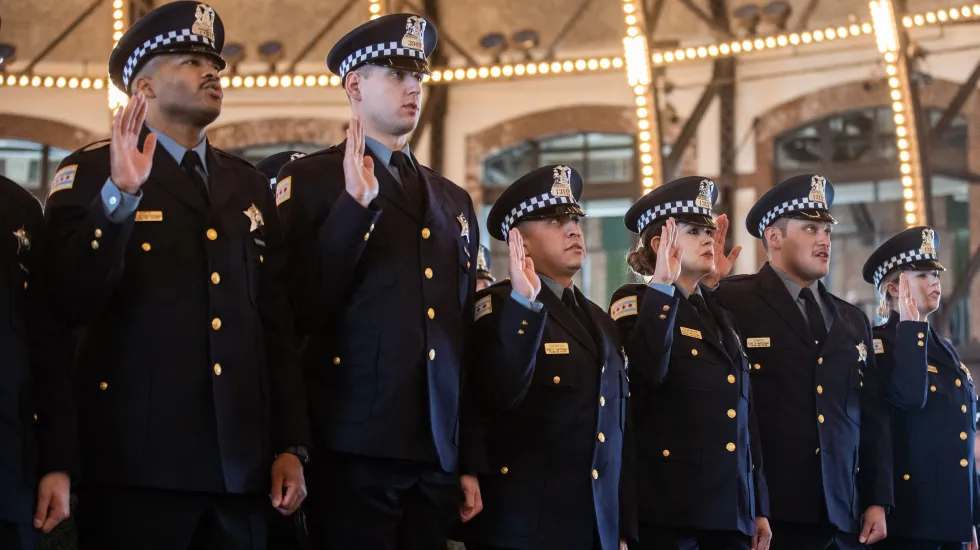
The latest report on the Chicago Police Department’s compliance with its consent decree on policing reform has some encouraging news — but Chicagoans should not be satisfied.
The good news is that CPD has gained ground since the last progress report and is now in some degree of compliance with 380 of 523 — 73% — of reforms outlined in the 2019 federal consent decree, according to the latest report released Monday by independent monitor Maggie Hickey.
Editorials
Even so, it’s been three years since the consent decree took effect in 2019, so it would be far more encouraging if CPD was in full compliance with more than 23 reforms. Meanwhile, the department is only in preliminary compliance with 281 sections in the consent decree and in secondary compliance with 76, as the Chicago Sun-Times’ Tom Schuba reported.
Police Supt. David Brown says the numbers show “real and significant progress,” pointing to the monitor’s latest previous report that showed CPD at some level of compliance with just over half of reforms.
But this isn’t about checking off more boxes. Lasting reform must mean more than that.
For reform to be a success, Chicago must have a police department staffed with officers who are committed to building trust with communities and working with them to bring down crime and improve public safety.
The monitor’s report shows too many outstanding deficiencies, particularly in the realm of community trust, for us to celebrate. Along with adopting a new foot pursuit policy — something that’s now months past deadline — CPD still has a lot of work to do with strengthening community bonds, data collection and staffing, the report says.
It’s telling that Hickey took the unusual step of attaching a letter to Monday’s report, stating that police must reduce crime as “community partners,” which requires “building, maintaining and rigorously protecting community trust and confidence.”
Hickey’s letter slammed members of the department “who believe crime reduction is separate from, or even opposed to, reform efforts.”
That, in our view, points to the need for a dramatic culture shift in CPD — and until that shift happens, reform will never become reality. The changes made to better the department will be at risk of crashing down like dominoes.
Trust before enforcement
Surveys show that many Black and Brown residents, many in low-income neighborhoods, simply don’t trust the officers who patrol their streets. Consider the poll commissioned by former U.S. Secretary of Education Arne Duncan, who was then mulling a run for mayor. His poll revealed that Black Chicagoans want more officers on the street — but they also thought “rebuilding trust” was more crucial in making the city safer than “tougher enforcement and more police.”
So if the department intends to add more sergeants in order bolster the dismal staffing and retention levels mentioned in the report, it will be for naught if the residents don’t have faith in the officers.
Opinion This Week
A weekly overview of opinions, analysis and commentary on issues affecting Chicago, Illinois and our nation by outside contributors, Sun-Times readers and the CST Editorial Board.
The monitoring team’s report, like the state attorney general’s memo recently obtained by the Sun-Times, also criticized the department’s “positive community interactions,” or PCI, program that involves officers keeping a tally of those interactions with residents.
The report recommends scrapping the PCI initiative so its “outstanding issues” — including the quotas set by Brown — can be addressed, a move this editorial board supports.
We’re all for community building, even if it comes in the form of small gestures like an officer helping a child who fell off a bicycle or returning a dog to its owners.
But if officers are not writing down who is on the receiving end of these supposed good deeds, or failing to explain why the encounter was positive, the program is useless.
Another concern raised in Monday’s report centers on the department’s foot chase policy, which was thrust in the limelight last year after 21-year-old Anthony Alvarez and 13-year-old Adam Toledo were killed by officers.
A temporary policy is in place, but why is it taking so long to have a permanent policy on something so important?
The September deadline has come and gone. Robert Boik, executive director of the department’s Office of Constitutional Policing and Reform, has attributed the delay to the need for more data since the department didn’t start tracking foot pursuits until three years ago.
“ ... Getting the policy right is more important than completing the policy quickly,” the department told community groups in the fall.
Of course.
But Chicagoans shouldn’t have to wait until eight years have passed, the time the department now has to meet all the demands spelled out in the consent decree.
We believe that CPD’s top officials take the consent degree seriously, and that is a hopeful sign.
But the entire department, from rookie cops to top brass, must make reform the top priority — and treat it with the utmost urgency.
Send letters to letters@suntimes.com







